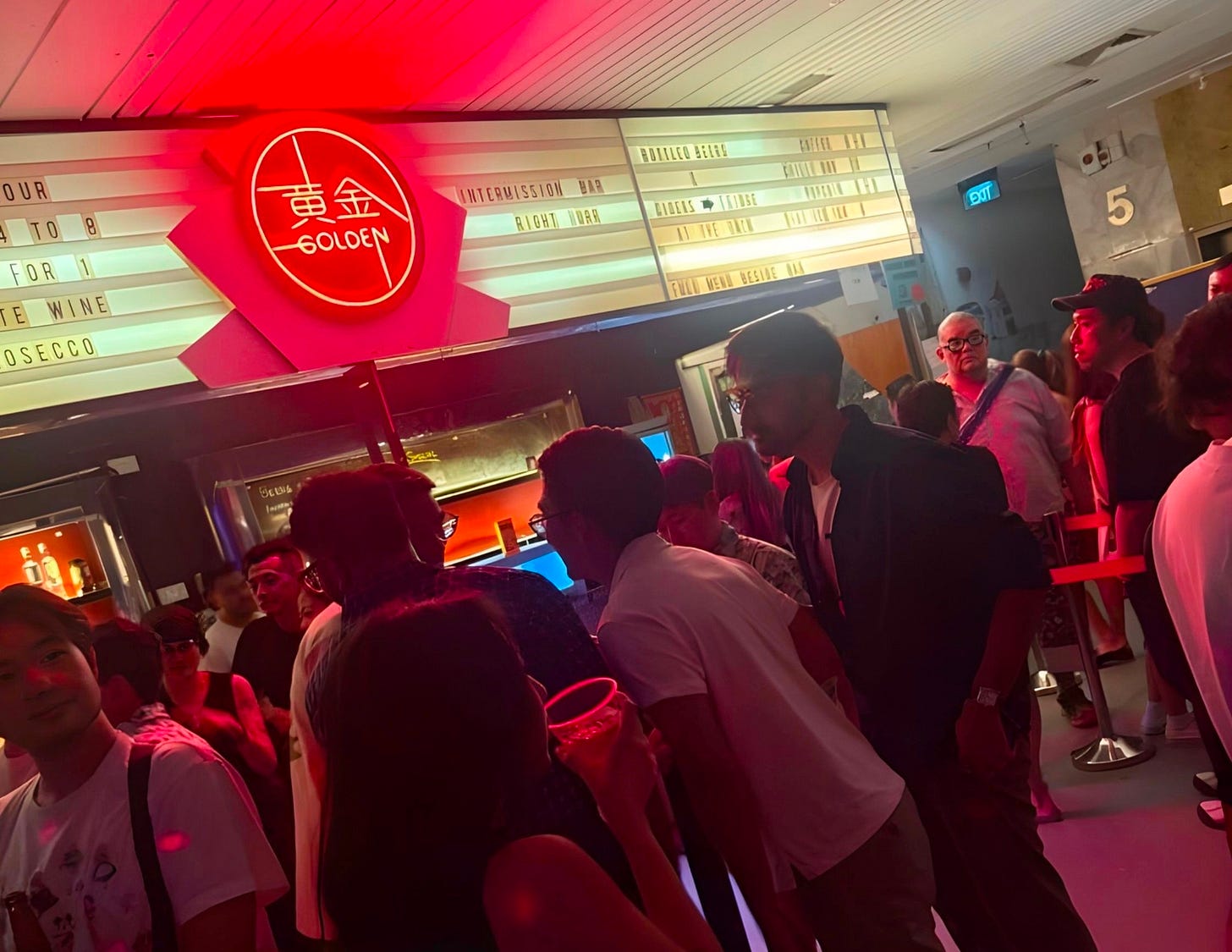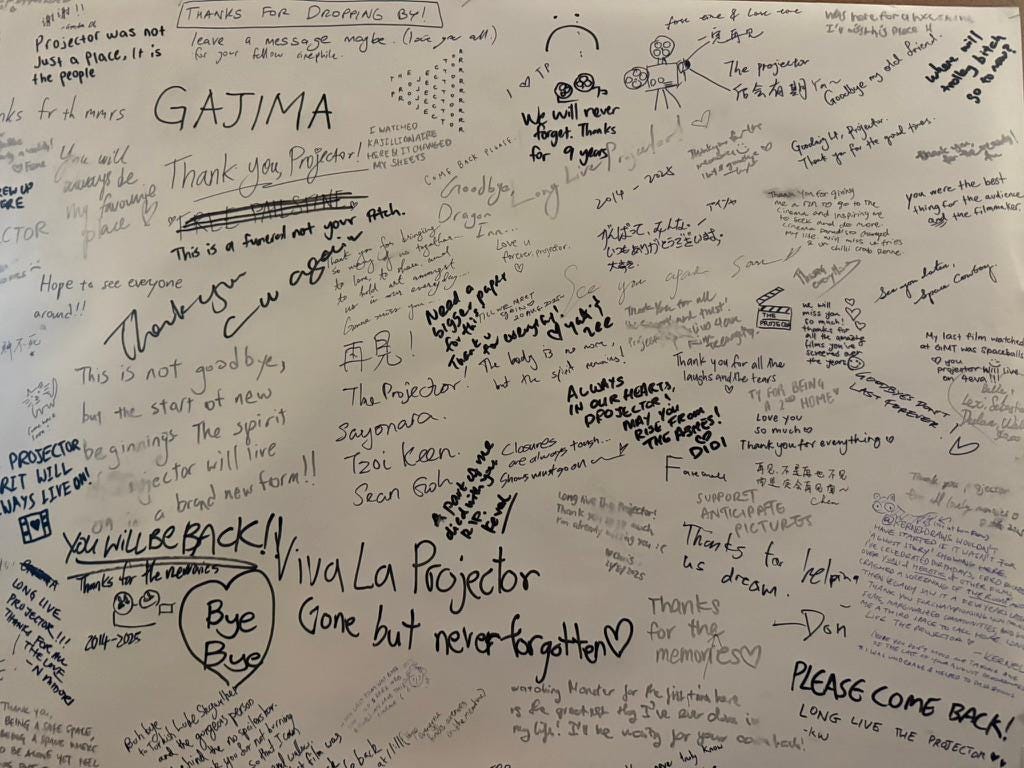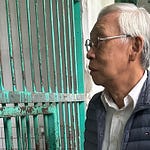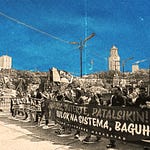I can quite vividly recall every time I went to The Projector since first stepping foot in there around 10 years ago.
There was always something about the indie cinema that made it particularly memorable and special for whatever film screening or event I was attending. It stood apart from watching a movie at a multiplex (which would likely be almost identical to every other multiplex), or attending a talk in another drab auditorium. Going to The Projector felt like being in a space with its own distinct character, different from what you’d find anywhere else in Singapore.
I remember having a blast watching newly released blockbusters, like Star Wars: The Force Awakens and the remake of West Side Story, or attentively sitting through low-budget indie films and documentaries, ranging from Untracing the Conspiracy (on Operation Spectrum, where over 20 people were detained without trial in Singapore in 1987), to Kedi, a documentary following the beloved and extremely spoiled street cats of Istanbul.
The venue was also a haven for civil society groups, a free space where people could discuss issues considered off-limits elsewhere in Singapore. I was in the auditorium for the official launch of pro-democracy platform, New Naratif; I sat though panel discussions on free speech (or lack thereof) in Singapore; and I was in the crowd for the release of a report on the state of LGBTQ+ rights in the country. (More recently, The Projector stepped in at the last minute to host the Transformative Justice Collective’s TJFest, after the authorities all but blocked it from going ahead in its original venue).
On The Projector’s social media pages, the managers’ philosophy was summed up simply: “Not your average cinema.” It was an unassuming yet bold claim, but one they always lived up to.
Now, beneath that sentence, there’s another, more solemn, line that reads: 2014–2025. This followed the sad news on August 19, when operators of The Projector announced it would be entering voluntary insolvency, ceasing operations with immediate effect.
Safe Spaces & Places
Generally speaking, Singapore is not always known for its devotion to the flourishing of the arts — particularly the more alternative or far-out variety.
While copious amounts of money have been ploughed into places like the National Gallery Singapore, these often cater to ‘safer’ or less provocative types of art which the establishment can live with. This in part comes down to decades of soft authoritarian control which has often led to outspokenness being — to put it mildly — discouraged, and where self-censorship and fear of reprisals are common. Either through laws and regulations or venue operators getting cold feet, Singapore can be difficult for people to find places where they can openly and publicly speak their mind, especially when it comes to issues considered taboo.
But there’s also the problem of property prices on the small island, which consistently rank among the highest in the world. Over the years, countless small businesses have suffered and closed due to spiralling rent costs — a trend that’s been exacerbated following the Covid-19 pandemic, and something that’s all the more pertinent for those in the arts scenes where, even at the best of times, money is in short supply. The result of this is that renting a venue for things like independent art or civil society events can come with a price-tag far exceeding most people’s means.
In short, this has meant that spaces for artistic and political expression are few and far between in the city-state. And that’s what made The Projector unique.
Despite forays into pop-up or temporary spaces elsewhere, its main home was in Golden Mile Tower, one of the older buildings in Singapore where the aged interior added to the distinctive look and vibe (complete with lifts which often felt like a roll of the dice as to whether they’d even make it up to the fifth floor). It was a venue that leaned into retro cinema aesthetics, with black all-caps lettering over a glowing white backdrop adorning its bar, and walls covered with dozens of posters of decades-old cult movies.
The Projector seemingly catapulted people into an alternative dimension of Singapore — one that very deliberately rejected the sanitised sheen of other well-known landmarks, maintaining an identity that was simultaneously vintage chic and inherently Singaporean. For all the wistful romanticising I’m sure there were things a lot of people thought could’ve been improved about the place. But the fact that it existed in Singapore at all is what made it a gem in the rough.
Spaces like that don’t come along often, and now, the old adage ‘you don’t appreciate what you have until it’s gone’ seems particularly germane. Now, I look back and treasure the memories I had there — and I know I’m not alone. I imagine that just about everyone who’s been to The Projector will have their own unique collage of experiences of the place, and remember what it meant to them.
In this episode
For this episode of the Currents podcast, I speak with Vincent Quek, CEO of independent film distributor Anticipate Pictures (which heavily relied on The Projector to screen indie films), and Becca D’Bus, the host of the drag show RIOT!, where we talk about the loss of The Projector, and what might happen as a result.
In the twists and turns of our conversation (one that’s much more lighthearted than some of the heavier topics I’ve covered in this series), we discuss their initial reactions to the closure, whether spaces like this are inherently fluid, how arts venues in Singapore can grow and evolve from here, and the importance of audiences showing up for all kinds of art — even those they might not be naturally drawn to; as Becca tactfully says: “You don’t know until you try it!”
If you want to read up more about reactions to The Projector’s closure, I’d recommend these articles from writers far more insightful and capable than I am, who share their thoughts, memories and experiences on a place that meant so much to so many people.













